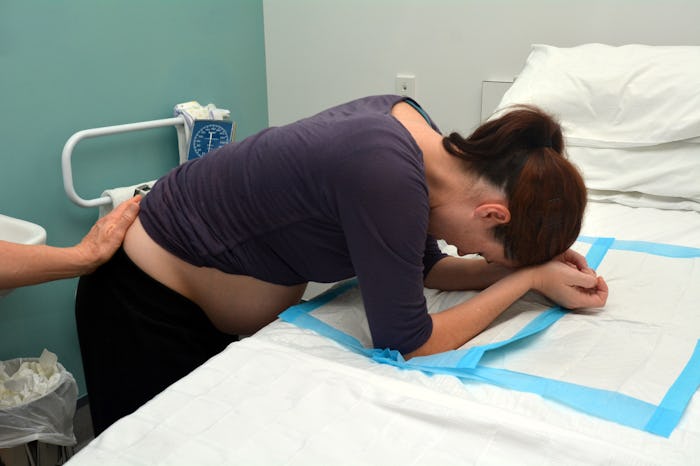Life

11 Things Every Pregnant Woman Needs To Know About Contractions
The most common association people make with contractions is that they signify the start of labor. The truth, however, is that contractions can happen at any time during a pregnancy. If you are pregnant, there are lots of things to know about contractions and pregnancy that can help you understand the different ways and reasons you experience these cramping sensations. From slight twinges to heavy hitting tightening, contractions are on a continuum of pain and each one can mean something different. Understanding the difference between false alarms, the real deal, and everything in between can save you a lot of worry throughout your pregnancy.
Feeling a contraction for the first time may be disorienting for some pregnant women. It's strange when your body does things without your permission. So to help you feel a little more in control, one of the best ways to determine which type you are experiencing, is to time your contractions, as the March of Dimes suggested. This will help you know if you are experiencing false labor, preterm, or full on labor contractions. Once you've determined that, you'll know what to do next.
Contractions are a natural part of pregnancy, so to understand more about how they work and what they mean, check out these 11 things to know about pregnancy and contractions to get you through the next nine months.
1They Can Start Early
Most women think they won't feel contractions until near the end of pregnancy, but it's possible to feel them very early on as well. According to Fit Pregnancy magazine, contractions can be felt in the first trimester, but it doesn't mean you're going into labor. Causes range from dehydration to ligament stretching to gas pains. Only contractions that are accompanied by bleeding should warrant a call to your doctor.
2They Can Be False
Typically, contractions are a sign of labor, meaning you're about to meet your baby. But not all contractions send the same message. As the website for What To Expect pointed out, false labor contractions are irregular and will most likely stop if you change positions. By timing your contractions and moving around a bit, you will be able to tell if these are the real deal or not.
3They Can Be Persistent
If you experience frequent, regular contractions that don't respond to rest or hydration, you may have a condition know as irritable uterus, Healthline reported. Although this condition is not normal, if you do experience irritable uterus, it's reassuring to know it's not harmful to you or the baby.
4They Are Important
As painful as they can be, contractions are play an important role throughout each stage of labor. As Baby Center reported, contractions open your cervix, push the baby through the birth canal, and dislodge the placenta. So even though they're not very fun, contractions are a vital part of the delivery process.
5They Can Be A Sign
Although some early contractions can just be false labor, the ones that stick around need your attention. Experiencing regular contractions before 37 weeks is a sign of preterm labor, as the website for the March of Dimes reported. Having this type of contractions means it's time to call your doctor.
6They May Mean You Need More Water
False labor contractions, called Braxton Hicks, can be brought on by dehydration, according to the website for the American Pregnancy Association. Staying hydrated each day can help to lessen the occurrence of contractions, in addition to being a general healthy choice.
7They Can Be An Excuse To Relax
As if you needed any more motivation than being pregnant to relax, kicking your feet up is a great way to ease contraction discomfort. Try taking a warm bath to kick those contractions to the curb, as Fit Pregnancy suggested.
8They Grow Stronger
According to What To Expect, contractions "become progressively more frequent, intense and generally (but not always) more regular, usually lasting about 30 to 70 seconds each." Also, they become more painful the closer together they are.
9They Can Be In Your Back
Not all contractions are felt in your stomach, some take the pain around to your backside. Often called "back labor," these back cramps often happen when they baby is in the position facing the mother's stomach, the American Pregnancy Association reported.
10They May Produce They Bloody Show
Since contractions are a sign of labor, it's no surprise other signs may accompany them. As Healhtline reported, the bloody show may be seen around the same time as contractions, although it can happen at different times for all pregnant women.
11They Hurt
Coming from a mother who has experienced both preterm contractions and back labor, I feel it's only fair I tell you that contractions hurt really bad. No use in sugar coating things. The good news is, you will survive the pain and the end result is worth the suffering.